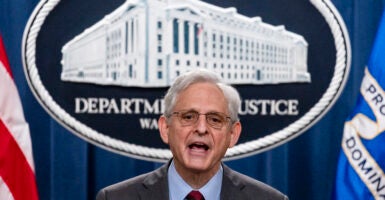The Department of Justice is taking steps to preserve charges against Jan. 6 defendants after the Supreme Court dealt a major blow to its efforts.
After the Supreme Court issued a ruling June 28 limiting the scope of an obstruction statute used to charge hundreds of Jan. 6 defendants, Attorney General Merrick Garland said the DOJ would “continue to use all available tools to hold accountable those criminally responsible for the January 6 attack on our democracy.”

Since then, the DOJ has taken first steps to salvage its charges, including asking judges for additional time to evaluate the impact of the ruling while stressing that the Supreme Court did not entirely reject its use of the statute.
The statute, Section 1512(c)(2), holds up to 20 years in prison for anyone who “obstructs, influences, or impedes any official proceeding.” However, the Supreme Court held in Fischer v. United States that to charge an individual under the law, “the Government must establish that the defendant impaired the availability or integrity for use in an official proceeding of records, documents, objects, or as we earlier explained, other things used in the proceeding, or attempted to do so.”
More than 355 Jan. 6 defendants have been charged with “corruptly obstructing, influencing, or impeding an official proceeding,” according to the DOJ.
“The DOJ is not happy about the Fischer decision and is currently strategizing ways to circumvent the Supreme Court’s ruling,” criminal defense attorney David W. Fischer wrote Wednesday for the blog “Declassified With Julie Kelly.”
For example, in certain cases the DOJ may attempt to recharge using corrected charging language in indictments, which will claim that particular defendants targeted the ceremonial ballot box or other documents used by Congress during the January 6 certification. Creative charging language, however, doesn’t change the evidence, which is quite strong that none of the J6ers were targeting evidence.
In a number of cases, the DOJ is now asking for additional time to evaluate how the ruling will apply.
“The Supreme Court remanded Fischer to the D.C. Circuit for further proceedings and to assess the sufficiency of the indictment on that count,” U.S. Attorney for the District of Columbia Matthew Graves wrote Thursday in defendant Taylor Franklin Taranto’s case. “Based on the Supreme Court’s opinion and the forthcoming proceedings in the D.C. Circuit, the government anticipates that it will need additional time to evaluate its prosecution of charges under 18 U.S.C. § 1512(c)(2).”
Graves’ office wrote Tuesday in defendant Tara Stottlemyer’s case that her conduct “may very well meet the changed standard” for the statute, noting that the “government is still evaluating Fischer’s impact on this and other January 6 cases.”
Prosecutors cited Supreme Court Justice Ketanji Brown Jackson’s concurring opinion, which noted that “it might well be that Fischer’s conduct, as alleged here, involved the impairment (or the attempted impairment) of the availability or integrity of things used during the January 6 proceeding.”
“If so, then Fischer’s prosecution under §1512(c)(2) can, and should, proceed,” Jackson wrote.
Jackson joined the majority in the case to limit the statute’s scope, while Justice Amy Coney Barrett wrote the dissent, which was joined by Justices Sonia Sotomayor and Elena Kagan.
Criminal defense attorney William Shipley, who represents Stottlemyer, wrote on X that the DOJ’s efforts to delay are “very frustrating for Tara and other J6 defendants who rightfully see Fischer as a victory that is now being withheld from them by procedural games.”
However, some defendants have already seen relief. Judges granted several defendants, including Kevin Seefried, Alexander Sheppard and Thomas B. Adams Jr., early release before the Supreme Court even issued its ruling.
The DOJ stated Wednesday in a filing it would not yet request Adams’ return to custody.
A federal judge also granted defendant Jorge Riley release on Friday pending the resolution of his motion to vacate his sentence. The DOJ did not oppose Riley’s request, though it declined to concede he had a “meritorious claim” under the Supreme Court’s ruling.
“In short, the United States’ decision to not oppose Riley’s motion for release should in no way be understood as a waiver or concession regarding the merits of Riley’s Section 2255 claims, collateral attacks based on Fischer generally, or any other January 6 case that may (or may not) be impacted by Fischer,” Graves wrote Thursday.
Likewise, the DOJ did not oppose defendant Katharine Morrison’s motion to terminate her special condition of home detention on Wednesday, but emphasized it should not be “construed as a concession” that she has a claim under Fischer.
Prosecutors requested dismissal of the obstruction count Friday in defendant Mark Sahady’s case to enable the trial to proceed in August on other counts and to “promote judicial economy and efficiency.”
“The vast majority of the more than 1,400 defendants charged for their illegal actions on January 6 will not be affected by this decision,” Garland noted in his statement after the Supreme Court’s ruling. “There are no cases in which the Department charged a January 6 defendant only with the offense at issue in Fischer.”
The DOJ did not respond to the Daily Caller News Foundation’s request for comment.
Originally published by the Daily Caller News Foundation






























